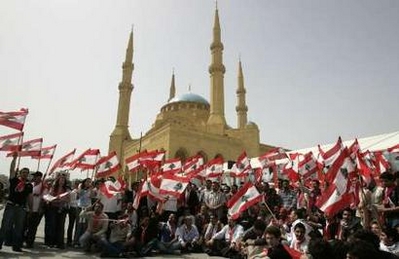 By CLAUDE SALHANI, UPI Contributing Editor, WASHINGTON, March 31 (UPI) -- As expected, there were no surprises at the Arab summit in Damascus that ended Sunday without any breakthrough regarding the Lebanese presidential crisis. If anything came out of the summit -- boycotted by 11 of the 22 members of the Arab League -- it is the obvious and deep divisions that remain between what is perceived as the pro-Washington countries and Syria. Supporting the Beirut government -- and the U.S. position -- are primarily Egypt, Jordan and Saudi Arabia, whose leaders did not attend the summit in Syria, preferring to be represented by lower-ranking ministers in protest against Syria's role in Lebanon.
By CLAUDE SALHANI, UPI Contributing Editor, WASHINGTON, March 31 (UPI) -- As expected, there were no surprises at the Arab summit in Damascus that ended Sunday without any breakthrough regarding the Lebanese presidential crisis. If anything came out of the summit -- boycotted by 11 of the 22 members of the Arab League -- it is the obvious and deep divisions that remain between what is perceived as the pro-Washington countries and Syria. Supporting the Beirut government -- and the U.S. position -- are primarily Egypt, Jordan and Saudi Arabia, whose leaders did not attend the summit in Syria, preferring to be represented by lower-ranking ministers in protest against Syria's role in Lebanon.Perhaps the one surprise, strange as it might appear, is that the voice of reason from the Damascus summit was none other than that of Libyan leader Col. Moammar Gadhafi, who warned his fellow leaders that they risk being deposed much like former Iraqi President Saddam Hussein. "One day, you will see yourselves in a similar situation and at that time no one should blame (anyone) but himself because we did not work sincerely to build a strong and unified Arab nation," said the Libyan leader. "Each one of you hates others. Syria is not on good terms with its neighbors, while Libya has stronger ties with Italy than it has with Tunisia or Egypt," Gadhafi said at the opening of the two-day summit. "No notable development has come out of this summit, as has always been the case with previous summits," said Gadhafi to journalists covering the event. "The most important point of the summit is the fact that we have recognized the existence of divisions, problems, and animosity between Arab countries and that we have to find the means to overcome these problems," he said.
The core of the problem pitting Damascus against other members of the Arab League and upon which they failed to agree is the accusation, primarily from Saudi Arabia, of Syrian interference in Lebanon's internal affairs.
Lebanon -- which has been without a president since November when Emile Lahoud stepped down after an already extended mandate at Syria's behest -- was among the countries that chose not to participate in the Damascus summit to voice their disapproval at Syria's.
After 17 failed attempts to "elect" a new president, a new date has now been set for April 22. Each of the previous attempts was blocked by the opposition. In a recent talk at Georgetown University, Bassam Haddad, a professor of Middle Eastern studies at George Mason University, joked that Lebanon had 18 different religious groups. "Perhaps they will get it right the 18th time," said Haddad.
The truth of the matter is that the so-called election is a mere formality as there is only one candidate on the ballot: former army commander Gen. Michel Sleiman.
Addressing the delegates, Syrian Minister of Foreign Affairs Walid Mouallem said Syria alone was incapable of persuading the Lebanese into dialogue. The same he said applied to Saudi Arabia, with whom the Syrian leadership has been at lock horns over the Lebanese affair. "Only a joint Syrian-Saudi effort supported by the Arabs can bring the Lebanese to dialogue," said Mouallem.
Perhaps grabbing at straws in trying to appear optimistic, Syria considered the mere fact that the summit took place at all was "a victory against Washington's policy; that trying to isolate Damascus." At the same time Damascus did not rule out the possibility that Washington would use military force if diplomatic efforts to isolate it were to fail. "We hope this will not happen," said the Syrian minister. "We want to avoid new destructions and more American deaths."
The leaders attending the 20th summit agreed on a joint declaration, much of which was non-binding and designed more as window dressing. It included a commitment to bolster Arab solidarity; to overcome inter-Arab disputes; closing ranks in the face of economic and political pressures; and promoting the Arabic language to keep up with scientific developments.
The declaration included the usual clauses promising support to the Palestinians and a warning to Israel against "excessive policies" against Palestinians; a call to Iraqi reconciliation and an end to foreign presence in the country.
And finally, the declaration condemned terrorism in all its forms and supported making the Middle East free of weapons of mass destruction, mainly nuclear weapons.
--
Claude Salhani is editor of the Middle East Times.